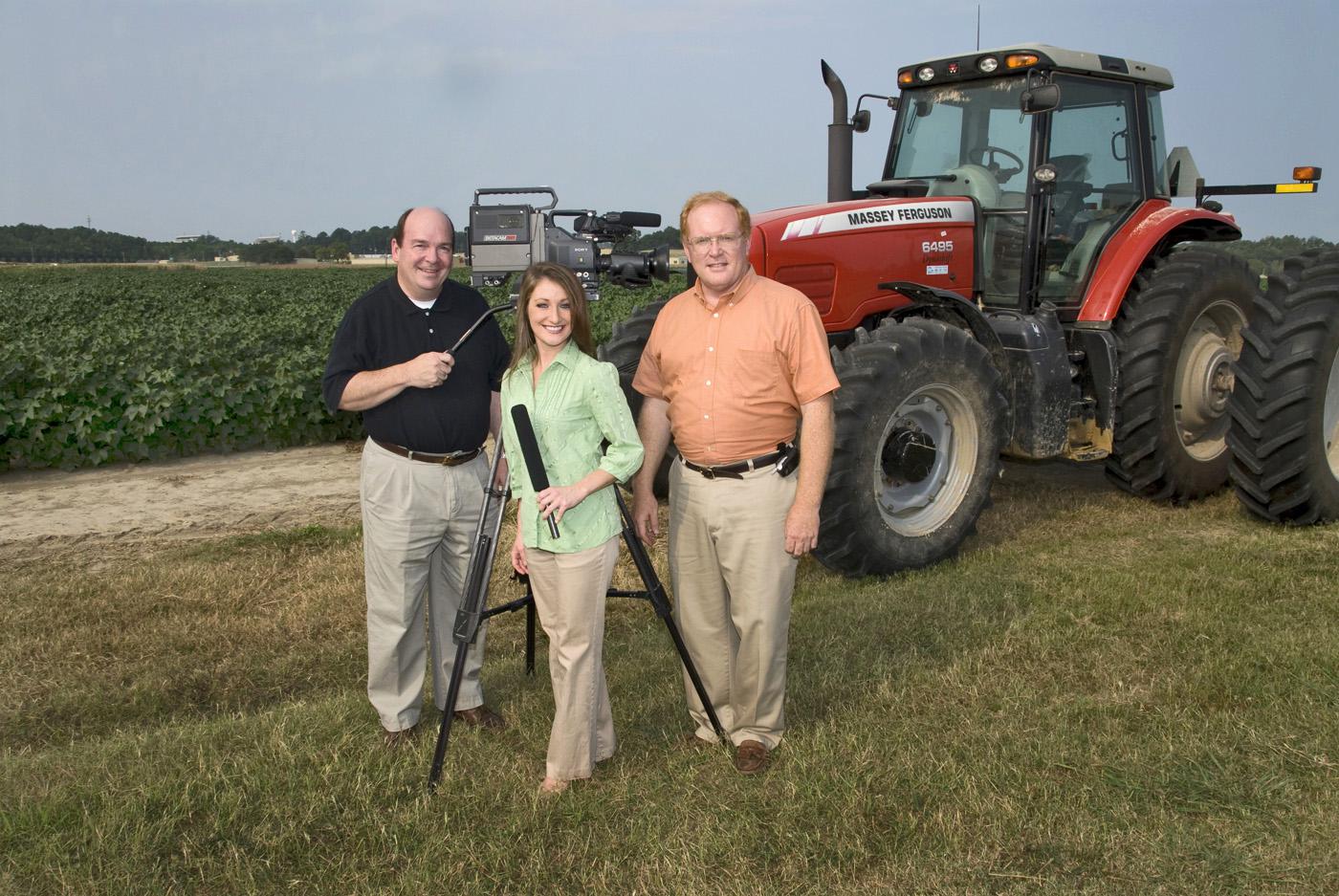Information Possibly Outdated
The information presented on this page was originally released on May 15, 2008. It may not be outdated, but please search our site for more current information. If you plan to quote or reference this information in a publication, please check with the Extension specialist or author before proceeding.
'Farmweek' plows into its 31st year on the air
MISSISSIPPI STATE -- In September 1977, the three commercial television networks -- ABC, CBS and NBC -- launched 22 new shows, most of which did not survive the season. While it was not on one of the big three networks, a show premiering that fall has survived and continues to inform and entertain its target audience.
“Farmweek,” a 30-minute weekly production of the Mississippi State University Extension Service, aired for the first time on Oct. 3, 1977, on what was then Mississippi Educational Television, now Mississippi Public Broadcasting. Today, the show is taped on Thursdays and broadcast on MPB at 6:30 p.m. on Saturdays, 6 a.m. on Mondays. The RFD satellite network broadcasts the show at 5 p.m. on Fridays, 6 a.m. on Saturdays and 8:30 a.m. on Sundays on DirectTV's channel 379 and Dish Network's channel 231.
“Extension wanted a television program as part of our educational service for Mississippi farmers,” said Bill Bost, Extension director from 1962 to 1981. “The late Charlie Deaton, the Leflore County representative in the Mississippi Legislature, had the same idea and suggested in 1976 that we approach ETV about carrying such a program. A year later we had a crew of professionals ready to put the program on the air.”
A nationwide search was conducted to find the right host for the program, and veteran newsman and Missouri School of Journalism graduate Bruce L. Johnson was hired as the program's director and anchor. During the summer of 1977, Johnson began all the tasks associated with creating a TV program, not the least of which was selecting the right name.
“We kicked around a lot of ideas for a name that conveyed the fact that this was a program with current news about agriculture,” said Johnson, now a video producer for a Maryland school district. “‘Farmweek' seemed to be the right choice, and it's gratifying to see that the name still sends the right message about the show's content.”
Reporter Tyson Gair and market reporter Mike Windham were hired to complete the “Farmweek” news crew, which was part of Extension Editorial Services.
Through an agreement with Mississippi ETV, the Extension crew would videotape about 10-15 minutes of news stories from around the state. This footage would then be incorporated into a program taped in the ETV studios in Jackson on Monday about two hours before it was broadcast at 7:30 the same night. In addition to the prerecorded stories, the program contained about 10 minutes of agriculture-related news, five minutes of commodity market news and two minutes of weather.
“It was a challenge to cover stories from all around the state and make the drive from MSU to Jackson each week to tape the show,” Johnson said.
Covering the entire state was, however, an adventure for the three young broadcast journalists, none of whom had a farm background.
“We were learning more about farming and agricultural enterprises than anyone else, traveling across the state doing fun things and getting paid to do it,” said Windham, now a financial consultant in his hometown of Brookhaven. “We were working with professional-grade equipment, the best on the market at the time. The ETV people were absolute professionals at what they were doing and protective of the quality of what they aired.”
Gair, now retired, took over duties as the show's main anchor and producer in late 1979 and continued to lead the show's news team for the next 10 years.
“Although I was born in the South, I actually grew up in Caracas, Venezuela, so I did not have a farm background,” Gair said. “To me, however, my lack of farm experience was a strength. I went into every story and onto every farm with a sense of curiosity that someone who was brought up on a farm would not have had, but with the goal of putting together a solid news program that provided vital, information to the farmers and consumers of Mississippi.”
With changes in technology have come changes in the production and delivery of “Farmweek.” Production was moved to the Television Center on the MSU campus in 1991, and the show is produced by the Office of Agricultural Communications.
Moving production to campus also created opportunities for student workers to gain journalism and broadcast experience by working on the program. At least two of those students now have successful careers in those fields. The show's first student worker, Neely Tucker, is a writer with the Washington Post. Jennifer Zeppelin entered broadcasting as a “Farmweek” student worker and is a broadcast meteorologist with a network affiliate in Denver, Colo.
While production technology, sets and other parts of “Farmweek” have changed over the years, the focus of the program remains the same -- service to the people of Mississippi.
“We present timely news that's relevant to Mississippi,” said “Farmweek” managing editor and co-anchor Artis Ford, who joined the production team in 1983. “We air the obvious big news, but we also look for the subtle changes in political policies or trends that will have big effects on Mississippi agriculture and forestry in the future.”
During the past three decades, “Farmweek” reporters have been on almost every type of farm in Mississippi, including row crop, poultry, catfish, forestry and all the others anyone would expect. They also have visited many of the more unusual agricultural operations, such as those producing worms, mushrooms and llamas.
Most of all, “Farmweek” has kept pace with viewers' needs.
“The program now presents a lot more information tailored to homeowners and land management,” Ford said. “It can be anything from growing trees to improving wildlife habitat on a viewer's property.”
For people who may not farm but do have a home landscape they want to improve, the program has “Southern Gardening,” a segment featuring MSU Extension horticulturist Norman Winter.
The current “Farmweek” team includes Ford, markets editor and co-anchor Leighton Spann, who has been with the program 14 years, and “Southern Gardening” producers Brian Utley and David Lack. The latest addition to the team is feature segment producer Amy Taylor, who joined the program in 2007 after graduating from the University of Southern Mississippi with a degree in broadcast journalism.
“I enjoy traveling Mississippi to cover agricultural news because it is a chance to learn what is new in the ag industry,” Taylor said. “During the past year, I have seen amazing technological advances and learned things about agriculture that I never even imagined.”
Although “Farmweek” is now three decades old -- an eternity for a TV program -- Spann said it is not showing its age.
“The original idea behind ‘Farmweek' was service to the people of Mississippi, and that is what we still provide,” he said. “Although agriculture has changed, there remains a strong connection to the land in our state, and ‘Farmweek' will continue to be a program for viewers who get their living and recreation from the resources of Mississippi.”



